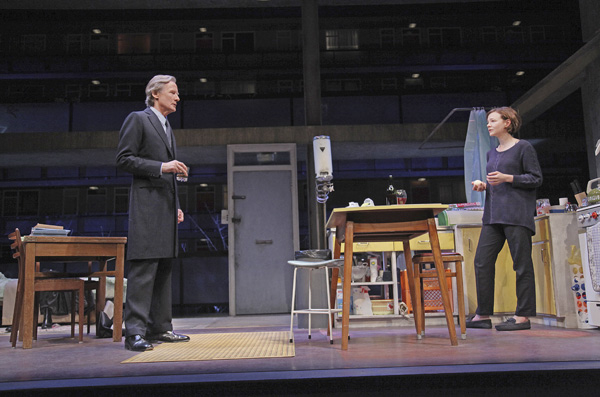Skylight
David Hare’s West End hit starring Bill Nighy and Carey Mulligan arrives on Broadway.

(© John Haynes)
Some plays speak to us through the ages. Some fade in relevance as the years pass. In the case of David Hare's Skylight, one wonders how it ever reached anyone in the first place. And since it indisputably did, what exactly was it saying to them? The 1995 London premiere of Skylight led to an Olivier Award for Best New Play and a 1996 Broadway transfer. The 2014 London revival starring Carey Mulligan (The Seagull) and Bill Nighy (The Vertical Hour) enjoyed rave reviews and a sold-out run. It has now crossed the pond and landed at Broadway's John Golden Theatre. While sure to delight Anglophiles and political progressives alike, its popularity may baffle anyone with a serious interest in good stagecraft.
Wealthy restaurateur Tom (Bill Nighy) pines for his longtime mistress Kyra (Carey Mulligan). Ever since Alice (Tom's wife) discovered the affair, Kyra has been teaching underprivileged children and living like a penitent nun in self-imposed exile in a depressing Kensal Rise housing block. Tom's son Edward (Matthew Beard) also misses dad's ex-fling and wishes she were there to mediate their increasingly contentious filial relationship. Now that Alice is dead, both the father and the son visit Kyra in an attempt to lure her back to the other side of the tracks. They seem genuinely uncomfortable to be in her cold apartment in this dodgy part of town.
While Kensal Rise is now the new frontier of London gentrification, could this play from two decades ago still contribute to our 21st-century discussion of wealth inequality? Hare offers some surprisingly prescient observations and stinging barbs, but they've been carefully insulated in heaps of down stuffing so as not to make the audience too uncomfortable. Director Stephen Daldry's lackluster production, featuring unremarkable performances from the two lead actors, does little to change that.
Unfortunately, no amount of innovative direction or exceptional acting could overcome the fact that Skylight, by design, is a boring play. The first act is overloaded with exposition as Kyra and Tom give us a painfully detailed rundown on their six-year affair. It's an awful lot of telling and very little showing. Hare has constructed an extravagant bit of stage business to compensate: Kyra cooks an entire spaghetti dinner during this expository marathon. This comes as a mercy to the actors, who otherwise would be relegated to good-old-fashioned drinking and chatting. Still, the result is about as thrilling as watching pasta boil.
Those interested in discussing larger themes in the theater will have to wait for the second act, when Tom and Kyra tussle about the real source of their estrangement: fundamentally incompatible worldviews. Tom is a hardscrabble entrepreneur from a decidedly unglamorous background. Like shopkeeper's daughter Margaret Thatcher, he has very little sympathy for the less extraordinary. Conversely, Kyra comes from money, but has decided to live her life in relative poverty, practically fetishizing the working-class folks she overhears on her daily commute. Both characters are pretty insufferable, although Tom seems like the one you'd rather encounter at a party.
Hare makes up for Kyra's lack of charm by giving her the best monologue in the show, in which she excoriates the "self-pity of the rich" and the asinine notion that capitalism is an altruistic endeavor. She caustically observes, "No longer do they simply accumulate. Now they want people to line up and thank them as well." The applicability to our modern mythology of "job creators" is uncanny.
Mulligan delivers this speech with astringent precision, in stark contrast to the rest of her forgettable performance. Nighy registers much larger, delighting the audience with his bag of tricks and the physicality he brings to the role. He grimaces and shrugs, evoking wild guffaws. Occasionally he'll become completely unhinged and shout his lines. It all feels inauthentic, like he's phoning it in with a few well-worn twitches and well-placed explosions. Beard delivers an excellent character study of those tics, convincingly playing the son of a highly affected man.
Bob Crowley's set is the most memorable aspect of the production. Kyra's apartment is indicated by an ugly Brutalist frame. Beyond that we see row upon row of identical council flats. It never allows us to forget the world of deprivation beyond this apartment and invites the mind to wander as we speculate about the lives and stories behind those brightly colored doors belonging to people who might not have as many options as the posh folks before us. But it also provides the one indelible mise-en-scène: Kyra and Edward sitting down for a fresh breakfast from the Ritz as life begins to stir in the surrounding slum. It's an apt encapsulation of the entire play. Mulligan inhales deeply through a cloth napkin purloined from the five-star hotel: Mmmmmm, smells like money. Truly, it's a comforting scent for us all.











